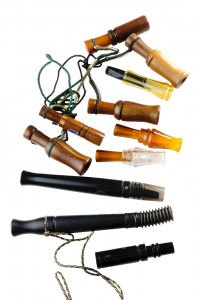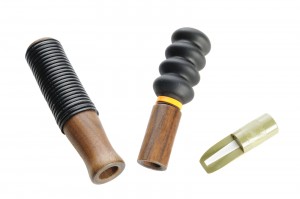Hunting requires plenty of skill in tracking, stalking, trapping, stealth and marksmanship. Plenty of patience, too.
Success also depends on using quality game hunting calls. There are many types of game calls and some hunters don’t fully appreciate the difference between open-reed and closed-reed calls. So let’s see which kinds bring the best hunting success.
Sounds Made by Game Calls
 When hunting game, different types of calls simulate different sounds. The whole idea is to draw your prey closer to you.
When hunting game, different types of calls simulate different sounds. The whole idea is to draw your prey closer to you.
Some mimic regular animal sounds to attract other animals closer, while different calls mimic distress sounds to attract predators. Bird mimicry calls are great for drawing in ducks, wild turkeys and other wildfowl. Other calls mimic mating, challenge and alarm calls to draw deer, elk, moose, bears, coyotes and foxes.
For a predator, a distress call is like ringing the dinner bell. Predator calls can mimic the general sounds and distress calls of deer, rabbits, mice, squirrels and birds. Coyotes and foxes, for example, are known to respond to these.
Electronic vs Hand-held Game Calls
Hand-held mouth-blown game calls are affordable and easy for any hunter to carry in a pocket. They are made predominantly of wood or plastic. The best are crafted by hand from wood and are far superior to plastic due to their truer tone and better resonance.
Electronic game calls are easy for a beginner to use and produce a wide range of sounds, but also come with a number of drawbacks. For starters, they are very expensive. The equipment is not always easy to transport, so a hunter’s mobility can be limited. Electronic game calls have more components than hand-held calls and thus risk malfunctioning in the elements. They also will run out of battery power.
Closed-reed vs Open-reed Hand-held Calls
 There are two types of hand-held game calls. One is built with the reed enclosed inside the device, the other with the reed exposed.
There are two types of hand-held game calls. One is built with the reed enclosed inside the device, the other with the reed exposed.
The closed reed call is simple to blow, easier to master and is recommended for novice hunters. Sometimes in a fast-moving hunting situation, simplicity is good. This type of hunting call can mimic the distress sounds of rabbits, but lacks the versatility of open reed calls.
The open reed game call requires more practice to use effectively but, once mastered, can produce a vast array of calls. Because the reed is exposed, the sounds from an open-reed call can be controlled and varied using your lips, tongue and teeth. In this way you can vary the volume, pitch and tone to imitate many types of game noises. It can mimic the sounds and distress calls of rabbits, deer, fawns, coyote pups, birds, etc.
Be sure you understand what each type of game call can and cannot do before you head out hunting. Because the wrong kind of call can make for a long and frustrating hunting trip. Experienced and successful hunters often have a preference for one call or another, but the wise ones carry both open-reed and closed-reed calls with them on a hunt.
Creative Commons Attribution: Permission is granted to repost this article in its entirety with credit to Dan Thompson Game Calls.








